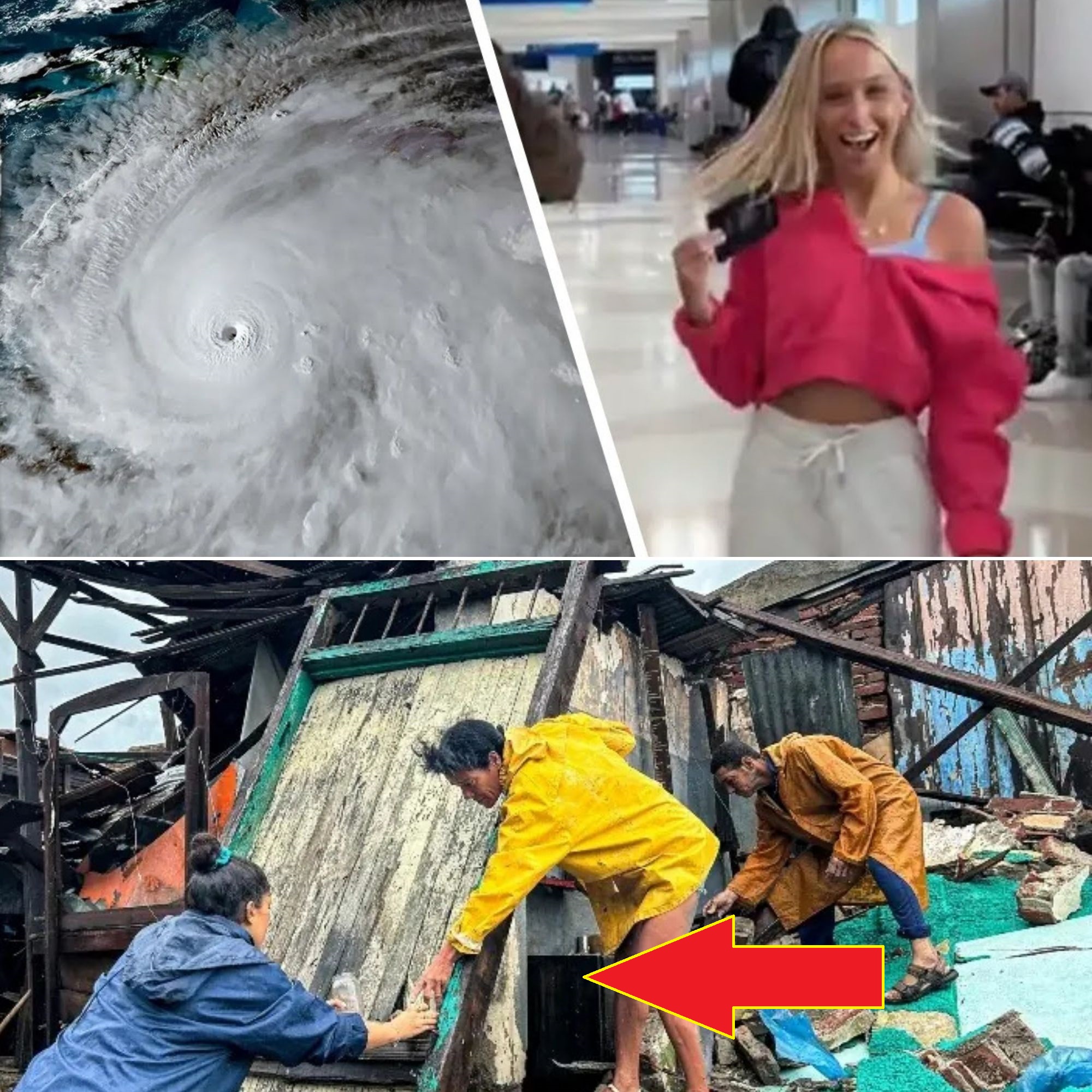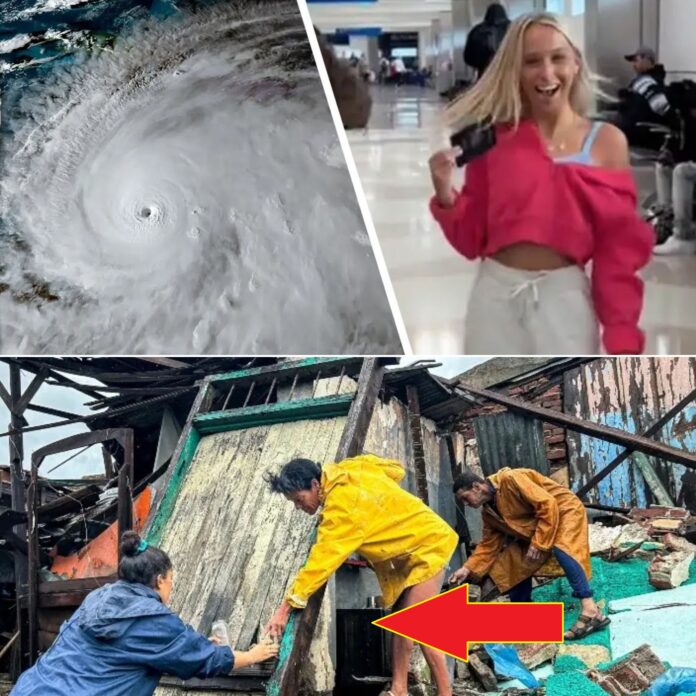“Hurricane Melissa out here messing with my vacation…” 🌪️😡
A carefree TikTok star jets off to Jamaica’s beaches, cocktails in hand, right as a Category 5 monster roars in—ignoring every dire warning. What happens when paradise turns into a nightmare, and her smug posts go viral for all the wrong reasons?
The backlash is brutal, the storm unforgiving. Click to see how her tone-deaf trip ended in total regret—and why the internet’s calling it karma served with a side of sand.

As Hurricane Melissa, the most ferocious storm of the 2025 Atlantic season, barreled toward Jamaica with winds howling at 185 mph and a path of biblical devastation, one American influencer’s ill-timed beach getaway became the internet’s whipping boy. Hannah Grubbs, a 24-year-old Nashville-based TikToker with a flair for fashion hauls and travel vlogs, touched down in Montego Bay on Oct. 24, mere days before the Category 5 behemoth’s landfall. What started as bubbly airport reels captioned “Us on our way to Jamaica during a hurricane” devolved into a cascade of complaints—”Hurricane Melissa out here messing with my vacation”—that ignited a social media inferno. By Oct. 29, as Melissa’s floods claimed at least 12 lives across the Caribbean and left 240,000 Jamaicans powerless, Grubbs had scrubbed her videos, issued a tearful apology, and watched her follower count plummet by 50,000 overnight. Critics branded her “tone-deaf trash,” accusing her of exploiting a crisis for clout while locals hunkered in shelters. The saga, unfolding against a backdrop of emergency declarations and rooftop rescues, underscores the perils of performative travel in an era of climate chaos—and the swift sword of online accountability.
Grubbs, whose dual TikTok accounts boast a combined 369,000 followers built on sponsored swimsuit try-ons and “day in the life” montages, announced her Jamaica trip with the nonchalance of a weekend brunch. Flying out of Nashville International on American Airlines Flight 1472, she and a female companion—identified in videos as fellow content creator Mia Reynolds—filmed themselves strutting through security, overlay text flashing: “Us on our way to Jamaica during a hurricane.” Posted Oct. 24 at 2:15 p.m. CDT, the clip racked up 1.2 million views in hours, a mix of thumbs-up from fans (“Queen of adventure!”) and early side-eyes (“Girl, check the weather?”). The National Hurricane Center (NHC) had issued its first advisory on Melissa just 48 hours prior, tracking the storm’s explosive intensification from a tropical depression off Africa’s coast into a record-breaker rivaling Hurricane Gilbert’s 1988 fury. Jamaican Prime Minister Andrew Holness, in a nationally televised address Oct. 25, urged all non-essential travel to cease: “This is not a drill. Melissa will be catastrophic—protect your lives.” Flights were grounded island-wide by Oct. 26, but Grubbs’ itinerary, booked through a budget resort deal via Expedia, locked her in.
Touching down at Sangster International Airport amid gathering clouds, the duo checked into the all-inclusive Royal Decameron Montego Beach, a sprawling Negril property touting “paradise uninterrupted.” Initial posts painted a glossy escape: A sunset cocktail reel captioned “Pretending there’s not a Category 5 hurricane hitting,” showing them clinking piña coladas at the tiki bar, garnered 800,000 likes before the tide turned. By Oct. 27, as outer bands lashed the coast with 60-mph gusts, Grubbs’ tone shifted to petulance. One video, filmed from her balcony overlooking the churning Caribbean, captured her stomping dramatically as rain pelted the glass: “Hurricane Melissa out here messing with my vacation. Like, can we get a break?” The overlay—paired with a sad-face emoji—exploded into backlash territory, viewed 3.5 million times before deletion. Comments flooded in: “While you’re whining, Jamaicans are losing homes,” from user @jamaicastrong; “Bragging that locals are serving you instead of with their families? Shameless,” from @climatejusticewarrior. Another, from a Montego Bay resident: “My roof’s gone, power’s out—enjoy your ‘mess,’ tourist.”
The videos, stitched together in a now-infamous compilation by Instagram meme account @daadisnacks, went supernova: 4.8 million views by Oct. 28, captioned “How can I make a Category 5 hurricane about me.” @daadisnacks, run by a 28-year-old Atlanta satirist, amplified the outrage with side-by-side clips of Grubbs’ poolside pout versus NHC radar loops of Melissa’s eye wall. X (formerly Twitter) erupted under #InfluencerKarma, with 150,000 posts by Oct. 29, including takedowns from celebs like actress Kerry Washington (“Privilege isn’t a filter—read the room, Jamaica needs you silent”) and meteorologist Al Roker (“Travel tips: Weather apps exist for a reason”). Grubbs’ Instagram, @hannahgrubbsstyle with 250,000 followers, saw a 20% engagement drop, sponsors like Fashion Nova pausing collabs. “This isn’t just dumb—it’s dangerous,” fumed one commenter, echoing fears that such posts glamorize risk, potentially luring copycats.
Melissa’s wrath hit Jamaica square on Oct. 28 at 2:47 p.m. local time, slamming ashore near New Hope in St. Elizabeth Parish as a high-end Cat 5 with 185-mph sustained winds—the strongest landfall on the island since records began in 1851. The storm surge swallowed coastal roads, ripping palms from resorts like Decameron and flooding Montego Bay’s airport tarmac. Jamaica’s Office of Disaster Preparedness reported 12 fatalities by Oct. 30: seven from drowning in flash floods, three from flying debris, and two from carbon monoxide poisoning in storm-damaged homes. Over 240,000 households—nearly 20% of the island—lost power, with 382 of 800 shelters housing 6,000 evacuees. Local Government Minister Desmond McKenzie, surveying wreckage in Savanna-la-Mar, decried the “unprecedented fury,” estimating $2.5 billion in damages to agriculture, tourism, and infrastructure. “Our farmers’ crops are underwater; hotels shuttered for months,” he told Reuters. In Haiti, Melissa’s precursor bands killed 40 more, swelling the Caribbean death toll to 59. The storm, now a Cat 3 remnant churning toward the U.S. Southeast, prompted evacuations in the Bahamas and Florida Keys.
At the Decameron, chaos reigned. Grubbs’ final pre-landfall video, posted Oct. 27 at 8:42 p.m., showed staff taping X’s on windows—”to keep glass from shattering”—and herding guests to the second-floor ballroom. “Prayers for Jamaica and the whole island,” she added in voiceover, a half-hearted hedge that rang hollow amid the mockery. As winds escalated to 120 mph overnight, the resort lost electricity; Grubbs and Reynolds bunked in a conference room with 150 others, phones dying on spotty Wi-Fi. Post-storm footage, leaked via hotel guests to TikTok, captured the aftermath: Palm fronds impaling lounge chairs, the infinity pool a debris-choked lagoon, and Grubbs—hair matted, makeup streaked—filming a subdued “We’re okay but… this sucks” that she never uploaded. Evacuated Oct. 29 on a Red Cross-chartered flight to Miami, she landed stateside to a digital lynching. Her apology reel, dropped Oct. 30—”I was clueless, insensitive. Donating to relief efforts”—clocked 2 million views but drew sneers: “Too little, too late,” topped the comments.
The scandal ripples beyond Grubbs. Travel influencers, a $15 billion industry per Influencer Marketing Hub, face mounting scrutiny for crisis-chasing. “This isn’t adventure; it’s entitlement,” said Dr. Lena Torres, a Vanderbilt media psychologist, in a CNN interview. “Grubbs tokenized a tragedy, turning evacuees into backdrop for her brand.” Jamaica’s Tourism Minister Edmund Bartlett, addressing the fallout Oct. 31, called for “responsible tourism”: “Visitors, respect our warnings—or stay away.” Airlines like American and JetBlue, stung by optics, suspended Jamaica routes until Nov. 5, citing runway craters. Globally, the NHC reported a 15% uptick in “storm tourism” queries post-Melissa, but experts warn of insurance voids and legal liabilities—Grubbs’ travel policy, per buried Expedia fine print, excludes “foreseeable natural disasters.”
Grubbs, now holed up in Nashville, has gone dark save for the apology. Friends describe a “wrecked” 24-year-old: “She thought it was edgy content—didn’t see the human cost.” Her follower bleed continues, but a silver lining emerges: Relief donations spiked 30% via GoFundMe campaigns like “Jamaica Strong Against Melissa,” topping $1.2 million. As cleanup crews haul twisted metal in Negril and families rebuild in Savanna-la-Mar, Grubbs’ folly serves as cautionary reel. In a warming world—2025’s Atlantic season already the hottest on record with five named storms by November—bragging rights yield to grim realities. For the influencer who chased sun amid shadows, paradise proved punishing: A viral villain in vacation wear, schooled by the storm she slighted. As one Jamaican survivor posted: “Melissa took our roofs, not our spirit. Take notes, tourist.”
